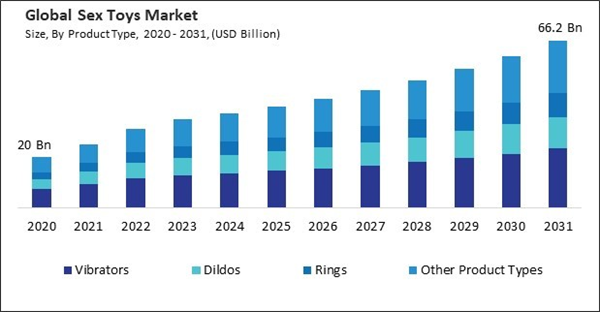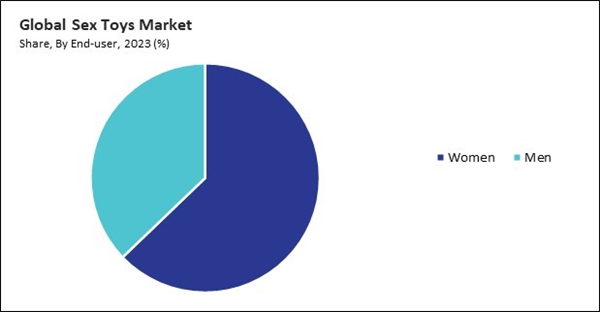North America has been at the forefront of accepting and normalizing sexual wellness, and the region’s robust e-commerce infrastructure makes these products easily accessible. Additionally, the growing focus on sexual health and self-care has contributed to the demand for such products. The U.S. and Canada have seen a surge in consumer awareness and acceptance, supported by progressive advertising, celebrity endorsements, and various brands catering to diverse preferences. Thus, the North America segment procured 43% revenue share in the sex toys market in 2023. A combination of societal openness, high disposable incomes, and widespread access to sexual wellness products drives the regional market.
Awareness of sexual wellness is increasingly recognized as vital to overall health, with substantial support from research and health education. Studies from the Journal of Sex Research and the American Journal of Sexuality Education show that maintaining sexual wellness can improve mental well-being, reduce stress, and enhance satisfaction in relationships.
Additionally, as people find themselves with more discretionary income, they are not only able to meet essential needs but are also investing in products that enhance their lifestyle, personal enjoyment, and well-being. This shift in spending habits opens the door to premium wellness products, including sex toys, which are no longer viewed solely as luxury items but as valuable tools for personal health and satisfaction. Therefore, as disposable incomes continue to rise, particularly in emerging markets, the sex toys market is expected to see sustained growth.
However, in numerous cultures and societies around the world, conversations about sexual wellness and the use of sex toys are still shrouded in stigma. This taboo stems from deeply ingrained cultural, religious, and societal beliefs that portray sexuality as a private or even forbidden topic. As a result, even expressing an interest in sexual health products can lead to social judgment, embarrassment, or disapproval. Hence, such factors may hamper the growth of the market.
Driving and Restraining Factors
Drivers
- Rising awareness of sexual wellness
- Increasing growth of e-commerce platforms
- Growing disposable income of consumers
Restraints
- Social and cultural taboos around the world
- Limited access in developing regions
Opportunities
- Rapid advancements in technology
- Growing number of specialty retailers and boutiques
Challenges
- Substantial privacy and discretion concerns
- Limited marketing and advertisement channels
End User Outlook
Based on end-user, the market is bifurcated into women and men. The men segment procured 37% revenue share in the toys market in 2023. Social acceptance of sexual wellness products for men is gradually improving, helping to reduce the stigma traditionally associated with these items.Product Type Outlook
On the basis of product type, the market is classified into vibrators, dildos, rings, and others. The vibrators segment acquired 37% revenue share in the market in 2023. Vibrators offer a range of designs and functions, from basic to high-tech, catering to varied preferences and enabling users to personalize their experience.Distribution Channel Outlook
By distribution channel, the market is divided into e-commerce, specialty stores, and mass merchandisers. The mass merchandisers segment garnered 8% revenue share in the market in 2023. Mass merchandisers contribute to the market by offering accessible and budget-friendly options, often reaching customers who may not actively seek out sex toys but are open to exploring them when encountered in general retail spaces.Regional Outlook
Region-wise, the market is analyzed across North America, Europe, Asia Pacific, and LAMEA. The Europe segment acquired 29% revenue share in the toys market in 2023. The region has shown progressive attitudes toward sexual health, with many European countries actively promoting discussions around wellness and intimate care. Europe’s well-established retail and e-commerce infrastructure has facilitated the market’s expansion, allowing consumers access to a wide range of products.List of Key Companies Profiled
- VIBEASE
- DS Doll Robotics
- Athena’s Home Novelties, Inc.
- LELO AB
- MYSTERYVIBE LIMITED
- Lovense
- MYHIXEL
- Dame Products, Inc.
- b-Vibe
Market Report Segmentation
By End-user
- Women
- Men
By Product Type
- Vibrators
- Dildos
- Rings
- Other Product Types
By Distribution Channel
- E-commerce
- Specialty Stores
- Mass Merchandisers
By Geography
- North America
- US
- Canada
- Mexico
- Rest of North America
- Europe
- Germany
- UK
- France
- Russia
- Spain
- Italy
- Rest of Europe
- Asia Pacific
- China
- Japan
- India
- South Korea
- Singapore
- Malaysia
- Rest of Asia Pacific
- LAMEA
- Brazil
- Argentina
- UAE
- Saudi Arabia
- South Africa
- Nigeria
- Rest of LAMEA
Table of Contents
Companies Mentioned
- VIBEASE
- DS Doll Robotics
- Athena’s Home Novelties, Inc.
- LELO AB
- MYSTERYVIBE LIMITED
- Lovense
- MYHIXEL
- Dame Products, Inc.
- b-Vibe










